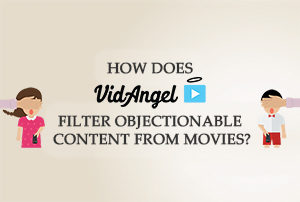 Today I am sharing research I have conducted on VidAngel – a service which offers censored versions of Hollywood movies.
Today I am sharing research I have conducted on VidAngel – a service which offers censored versions of Hollywood movies.
You may have heard about VidAngel last month as they hit the headlines due to a ruling in a court case against major Hollywood studios, including Disney.
The news spurred me on to take a close look at what they do, how they do it and what exactly they are filtering out of Disney movies. I built up a dataset of all filters they have for feature films on their site – over half a million objectionable items across 2,974 feature films.
VidAngel in a nutshell
 VidAngel is a Utah-based company which seeks to help audiences filter out objectionable material from mainstream movies. They have used two different methods to do so:
VidAngel is a Utah-based company which seeks to help audiences filter out objectionable material from mainstream movies. They have used two different methods to do so:
- 2014-16 – DVD ripping and providing an on-demand online video stream.
- 2017 to present – Interrupting streams from third-party SVOD services, such as Netflix and Amazon.
Between 2014 and 16, VidAngel bought DVDs, ripped them, removed objectionable material and then “sold” them to consumers. I use “sold” in quotation marks because users would in fact stream the movies from VidAngel under the ruse of logging it as a $20 sale, with a $19 refund a day later. This methodology was designed to effectively offer a streaming service for one dollar a day.
While this may sound clever to some, it did not impress the Hollywood studios. It didn’t help that VidAngel were kicking the biggest hornet’s nest possible by allowing users to stream the Star Wars movies before Disney had made it officially available to stream. Disney, Warner Bros, and Fox teamed up to sue the service and it’s this court case which was in the news last month. The most recent judgement says that VidAngel’s defence is not valid (more on that below) and so they have lost the case before it even went to trial.
The punishment in the case is yet to be agreed, with Variety suggesting it could be “between $950,000 and $152.5 million”. Given that VidAngel declared in their bankruptcy filings that they have around $2.4 million on hand, this could mean that VidAngel is not much longer for this world.
 However, since they ended this business model in 2016, they have not been idle. In 2017, they launched a new technology to achieve the same outcome. Their system sits between the user and their own streaming accounts, such as Amazon Prime or Netflix. Users tell VidAngel what types of material they do not wish to see, and VidAngel automatically skips these moments in the VOD stream.
However, since they ended this business model in 2016, they have not been idle. In 2017, they launched a new technology to achieve the same outcome. Their system sits between the user and their own streaming accounts, such as Amazon Prime or Netflix. Users tell VidAngel what types of material they do not wish to see, and VidAngel automatically skips these moments in the VOD stream.
No matter the technology used, many of you will be wondering how they are legally allowed to edit Hollywood movies. A provision in the 2005 “Family Entertainment and Copyright Act” (often referred to as the “Family Home Movie Act”) protects companies who provide “products or services that enable parents to skip over objectionable content during home viewing of movies”. They are only allowed to do so if it’s just editing a film on the fly (i.e. not creating a lasting edited copy) and if no new material is added (i.e. they can only skip content).
VidAngel cited this Act as their legal defence, even though it did not cover what they were actually doing – hence why they lost. However, it does cover their current SVOD-only offering.
VidAngel lists almost 3,000 feature films in their current service, the vast majority of which are PG-13 or R rated.
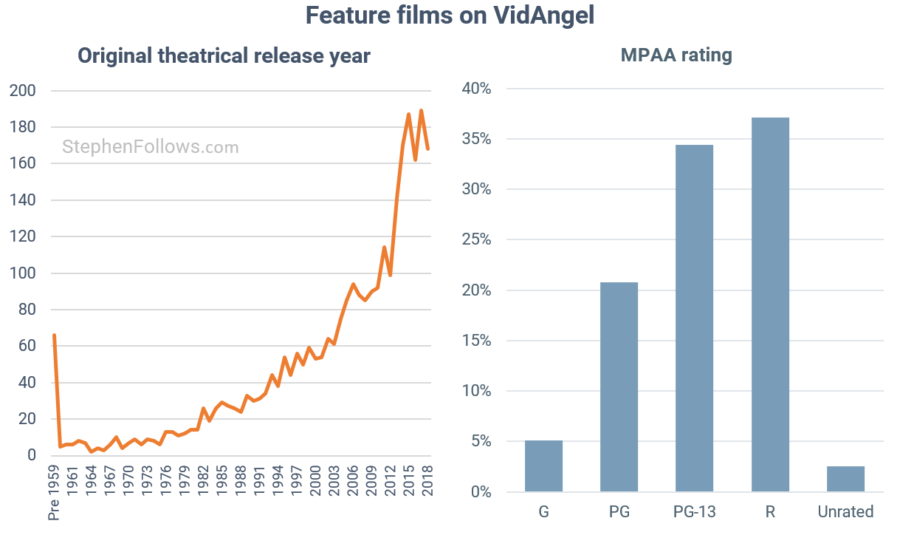
What does VidAngel filter?
 VidAngel has five categories of objectionable material:
VidAngel has five categories of objectionable material:
- “Language“, including blasphemous, profane, crude, discriminatory and sexual (actual, implied and innuendo).
- “Sex / Nudity / Immodesty“, including sex, kissing and nudity – all split by gender and sexual orientation.
- “Violence / Blood / Gore“, including graphic and disturbing images.
- “Alcohol or Drug Use“, covering legal, illegal and implied uses.
- “Miscellaneous“, including bodily functions, medical procedures and other content some could find objectionable.
Bad language accounts for almost half of all filters, largely because each instance is separately listed and can be filtered individually. The median number of bad language filters for feature films was 55, followed by violence (29), sex (20), drugs (3) and other filters (2).
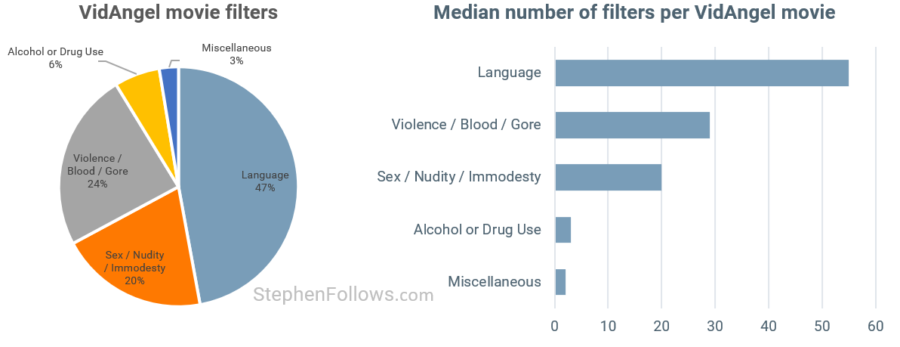
Fallen angels
Straight Outta Compton has the somewhat dubious honour of having the greatest number of filters, at 959.
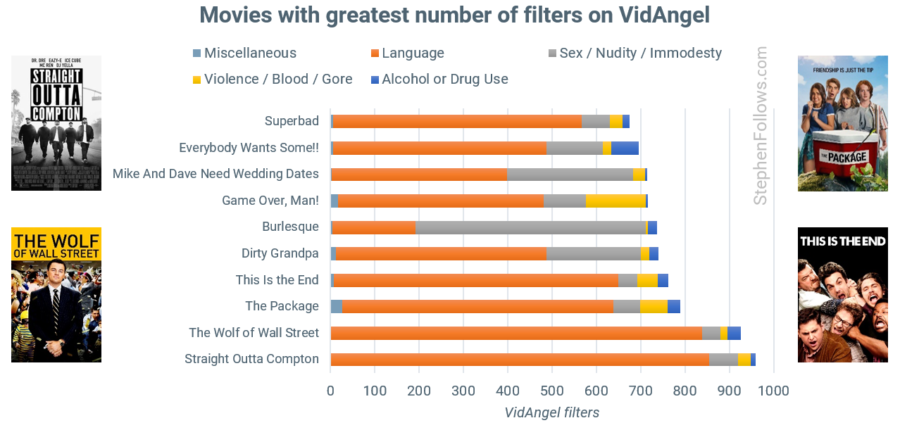
Bad language
The charts below show the top five most filtered swear words for movies on VidAngel and the percentage of films in which they are mentioned at least once.
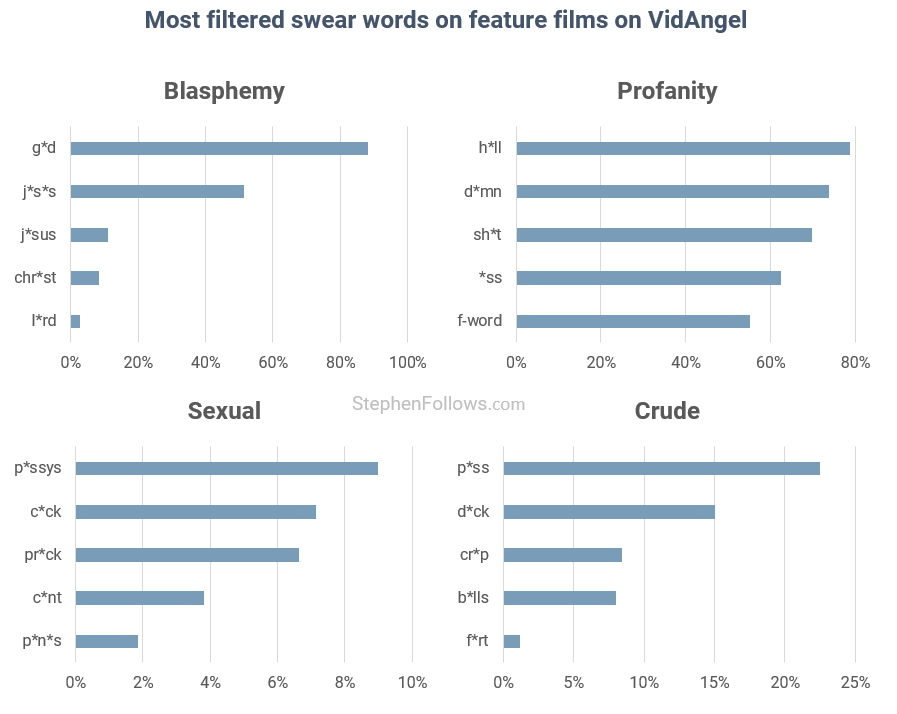
I’m not sure why a “c*ck” is “sexual” but a “d*ck” is “crude” but, as Tom Lehrer once pointed out, filth is in the mind of the beholder.
There are 297 uses of “British profanity”, 7% of which are uses of the word “bl**dy” in The Prestige.
Fewer than 1% of films have no bad language warnings. These include religious films (God’s Not Dead), documentaries (March of the Penguins), family movies (Big Hero 6) and films in the Lord of the Rings universe (although I think VidAngel may have missed Thorin’s insult “May his beard wither“).
Sex / Nudity / immodesty
The movie with the greatest number of these filters on VidAngel is the Cher classic, Burlesque. And I know what you’re thinking: “How long is Burlesque when you remove all the burlesque? Well, the running time drops from just under two hours to just over one hour.
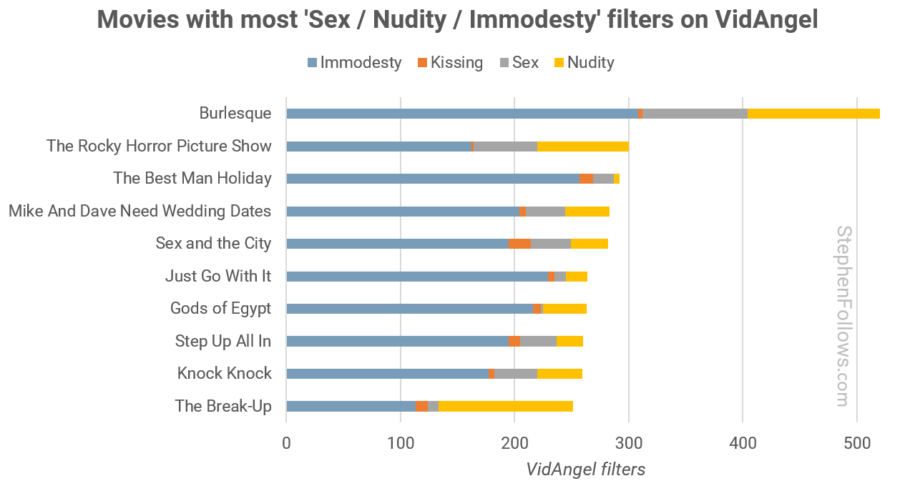
Children’s films are not immune to immodesty filters. Barbie in a Mermaid Tale may be rated G by the MPAA but it has 150 immodesty warnings on VidAngel. If you choose to watch the movie without any shots of Barbie’s midriff you’ll miss 22% of the movie. Likewise, High School Musical 2 without cleavage is 30% shorter and Aloha Scooby-Doo sans sex and immodesty saves you 11 minutes.
Violence / Blood / Gore
The violence league table is topped by two remakes: Conan The Barbarian and The Magnificent Seven.
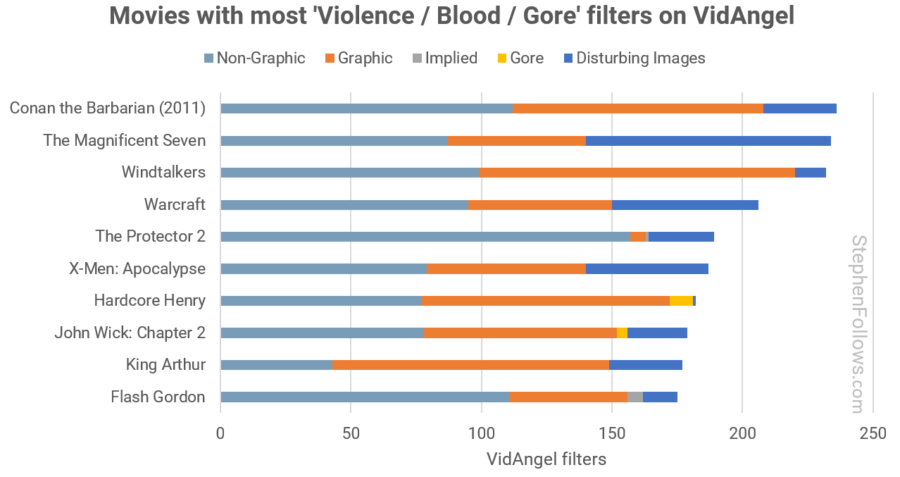
It takes all sorts
VidAngel is not just catering to the conservative Christian viewpoint. They also offer viewers the chance to filter out discriminatory language and behaviours which progressive liberals may be uncomfortable with or triggered by. This includes non-consensual sexual acts as well as racial, discriminatory or bigoted language.
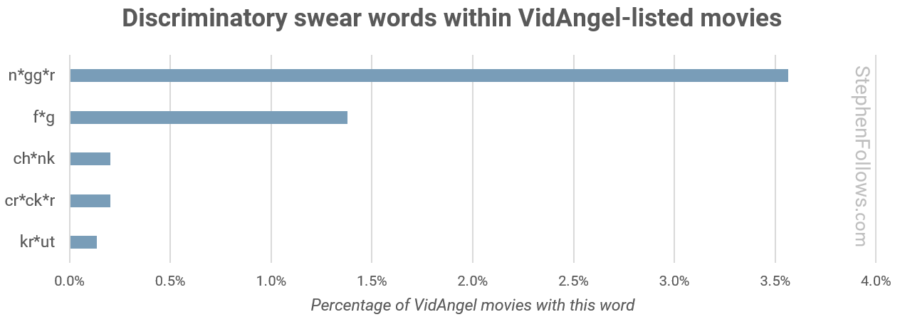
A filter on Baywatch is called “Credits” and is described as “Episode recap/outtakes”. There is no indication of any objectionable material within these scenes, other than human folly. I suppose discovering that The Rock is only human could be disturbing for some.
 They even offer filters for Star Wars fans who do not like the changes George Lucas made to the original trilogy in the late 1990s and early 2000s. A New Hope offers 10 “new scenes” filters, there are 20 on The Empire Strikes Back and 9 on Return of the Jedi. Not only that, but they offer “Jar Jar Binks” filers for Episodes I, II and III (208, 24 and 4 respectively).
They even offer filters for Star Wars fans who do not like the changes George Lucas made to the original trilogy in the late 1990s and early 2000s. A New Hope offers 10 “new scenes” filters, there are 20 on The Empire Strikes Back and 9 on Return of the Jedi. Not only that, but they offer “Jar Jar Binks” filers for Episodes I, II and III (208, 24 and 4 respectively).
The descriptions of these Star Wars filters are a joy to read, including:
- Han Shot first!
- More additional sarlacc nonsense.
- Womp rats: they’re not much bigger than two meters, which is huge for a rat.
- Max Rebo’s band plays an awful song. This footage was not in the original version.
- Jar Jar Binks is on screen. (This is phrase is cited 103 times for The Phantom Menace alone)
- Jar Jar Binks is in the background, spoiling a perfectly good shot of some flags.
- Darth Vader yells “no” again, completely pulling everyone out of the moment, and ruining the climactic moment of the trilogy.
- The Jabba the Hut scene that ruins the continuity of Han’s story. Also Boba Fett looks like a lackey, which just won’t do.
- Anakin Skywalker’s Jedi ghost is now played by Hayden Christensen instead of Sebastian Shaw. Really, George?
Given the anger, swearing, bad behaviour and violence described in most filters, the 275 Star Wars “Jar Jar / New Scenes” filters were a welcome relief.
Further reading
If you would like to go deeper on some of the topics I’ve covered today, then here are a few past articles you may enjoy:
- The sex, drugs and violence contained in MPAA ratings
- How much sexual violence is there in mainstream movies?
- Are movies with positive messages better than those without?
- The ascension of Christian films
Notes
 My data came from the VidAngel site and I applied metadata from IMDb, Opus and Box Office Mojo. I focused on their feature film listings, rather than their TV or stand-up entries.
My data came from the VidAngel site and I applied metadata from IMDb, Opus and Box Office Mojo. I focused on their feature film listings, rather than their TV or stand-up entries.
I reached out to VidAngel for help with the article and to give them a chance to add their thoughts on the recent court case and the topic more generally. Sadly, they bounced me between people and then cancelled a scheduled call. Therefore the research and article were completed wholly independently. VidAngel – if you change your mind please do drop me a line and I’d be happy to add your voice to the piece.
I chose to keep the swear words censored in the manner VidAngel does on its site, partly to reflect their own lexicon and also because I’m aware there may be VidAngel customers interested to know more about the service who would rather not read them. Researching the VidAngel bad language filters felt like completing a filthy crossword. Some blanks were easy to fill in (“sh*t”, “d*ck” and “b*tch”), some were much harder (“je*k”, “cr*ck*r”, “t*st*cls”) and some downright perplexing (“b*ld*”, “w*p”, “h**b”). Please do not write in with the correct answers.
As with any system relying on a number of human reviewers, the VidAngel process is not perfect. Only one of their listed movies ever mentions a condom (or “c*nd*m”, as they put it) and even then it’s just one use. This seems unlikely, given the number and types of movies in their dataset – Superbad mentions condoms five times in the script, but not at all in the VidAngel filters.
Similarly, sometimes the same swear word is sub-classified in two different categories. This could be down to context or just different reviewing styles. For example, “f*rt” is classed as “childish” in Captain Underpants but as “crude” in Caddyshack. I tweaked the groupings a bit to standardise the filters for this article.
The VidAngel listings have a very minor bug whereby filters are miscounted, presumably caused by hard-coding totals rather than dynamically counting. This means that when they add or remove filters, the total no longer matches. This affects almost 250 movies, albeit mostly only miscounting by one or two filters. A good example is Notting Hill which claims 106 filters can be applied but only provides 101 in the detail. This is relatively minor but I thought I would mention it to save any future researchers the pain of discovering it themselves! In today’s research, I used the true total over the claimed total.
Epilogue
I find topics like this fascinating as they force us to consider the nature of copyright versus consumer rights, and artistic vision versus audience freedom.
I can see why many people would want to have the option to remove material they find objectionable from mainstream works they may otherwise enjoy. In addition, VidAngel has taken a very pragmatic and reasonable attitude to how they do this, not standing in the way of the filmmakers’ revenue streams. On the other hand, I can see why studios may find the idea of commercial services standing between them and their customers unnerving, and how filmmakers would not be happy with others re-editing their work.
The results of court cases are often simplified and they flatten issues to a simple “winner/loser” outcome whereas in truth there is a whole lot of grey in this topic.

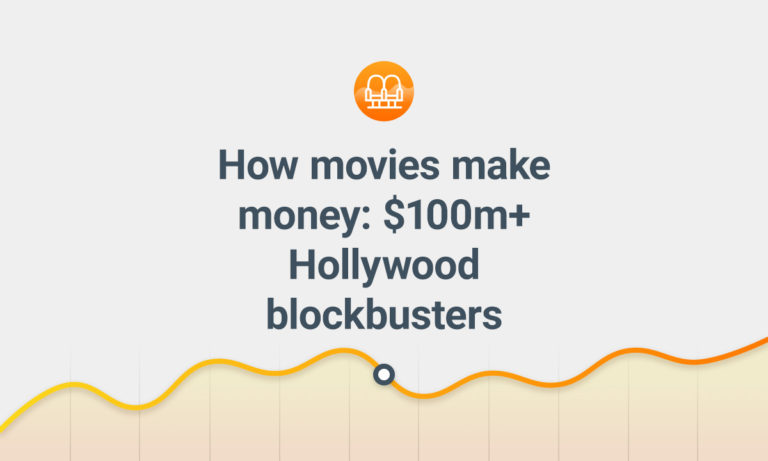
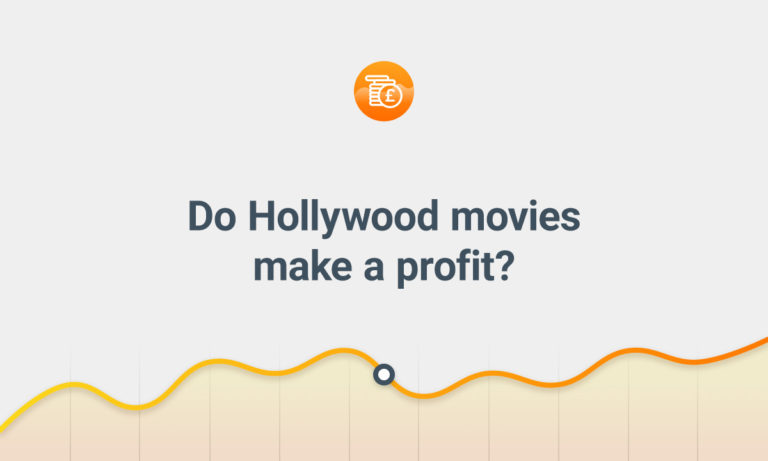


Comments
It doesn’t matter, they are getting shut down after the June 12th jury decision (damages.)
https://fox13now.com/2019/03/08/vidangel-loses-copyright-fight-in-lawsuit-filed-by-hollywood-studios/
Hi Logan. Even if VidAngel is closed down, I think the debate of filtering will live on. The issue that VidAngel have been found guilty of is not the core debate, it was their illegal methodology. What’s filtered and why will remain relevant to the industry and audiences.
This didn’t age well. Conveniently they learned and adapted and have further adapted to now get a monthly $9.99 from their users instead of the $1 they charged before. Stephen, I found this fascinating data thanks for compiling it all.
I didn’t even know VidAngel even existed – one learns something new in this crazy game every day!
I assume that it targets just the religious right in the US. The very idea that my movies are going to be ‘edited’ by some religious zealots in Utah makes me want to utter foul oaths, such as “May his beard whither!”
And by Jove, I’d mean it!
I am a user of Vidangel and Clearplay. I asked Disney+ if they will allow me to filter the cuss words out of Guardians of the Galaxy since when I take my little kids on the ride at the theme park, they will want to see the movie. I have not received an answer from Disney.
I can certainly understand why filmmakers would not want their work edited. However, being a father is challenging in this ever changing world. We battle a long spoke proverb of people “calling good evil and evil good”. It’s very confusing for our children. My job is to protect my children. Every parent has to make a choice and we don’t all agree. I think that is what the Family Protection Act does for us. As a citizen of the US, we have freedom to chose what is appropriate for our kids. Some movies have great story lines, but you can almost see a hidden agenda in the film. If there wasn’t, then why is there a problem with individuals filtering out that content? The movie maker still makes the money.
My wife and I used to love to go to movies. This filtering service sounds like it would be ideal for us. We would not mind giving Hollywood our support and money to watch their movies, if we could filter out some of the content. Where did the X-rated movie go? I don’t need to see Elton John ripping off his clothes and climbing in bed with another man but listening to the songs and hearing his life story, could be very enjoyable. What happened to George Carlin‘s seven words you can’t say on TV? I don’t need to hear that either. Do I have to turn off all content from Hollywood just because there may be something I don’t want to hear or see? There are many wonderful movies out there that could be made more appealing to me by simply screening out a few words. It rolls with the same mindset that you correct people that certain language, dress, and behavior is unprofessional and unwanted in the workplace.
Just say no. I haven’t watched TV or any movie over PG in over 20 years and couldn’t be happier. I’m learning all sorts of new things every day, spending more time with friends, with nature, in the garden, etc. One of my favorite quotes for the times we live in: “Whatever is true, whatever is honorable, whatever is right, whatever is pure, whatever is lovely, whatever is of good repute, if there is any excellence and if anything worthy of praise, let your mind dwell on these things.” Paul of Tarsus
Hollywood should try an experiment based on your filtering data. They should produce movies without profanity and explicit sex scenes and see if more watch their movies. Give people credit and believe they don’t need vulgarity thrown at them to enjoy a movie. We never go to R and rarely PG-13 because of language and the usual, and boring, sex scenes. VidAngel has made it possible to enjoy movies, once again.